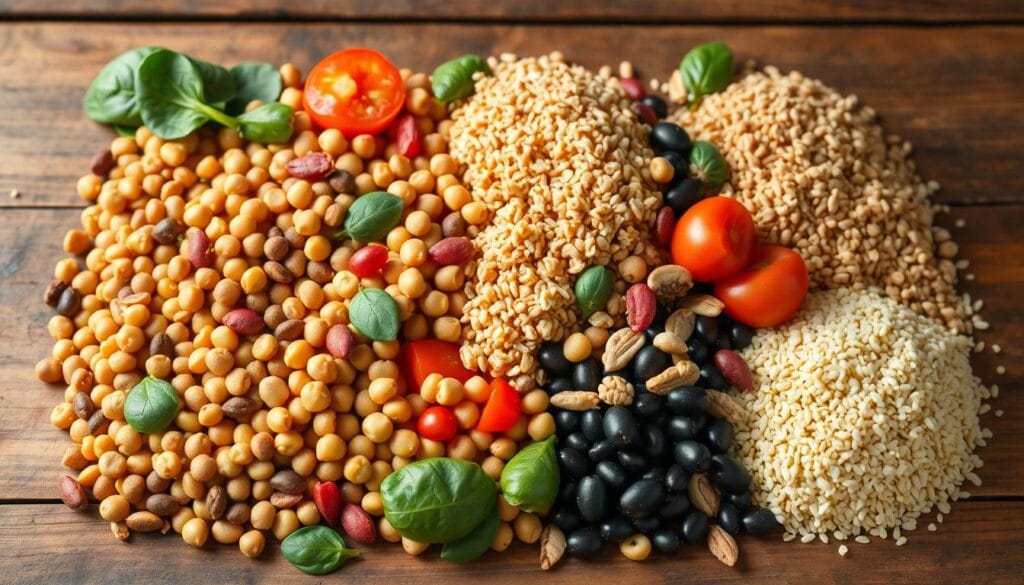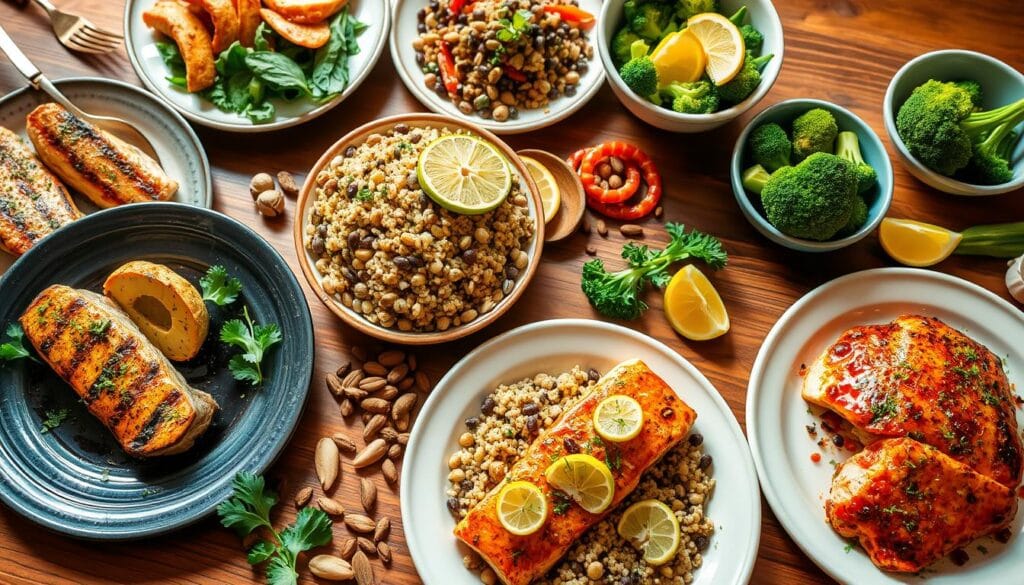As a fitness enthusiast, I know how key nutrition is for building lean muscle. After hours of workouts, I found that muscle growth happens in the kitchen, not just the gym. So, I’m excited to share my top tips for making protein-packed dinners that boost your muscle-building journey.
Getting the right nutrients is key for your fitness goals. Protein is especially important for repairing and growing muscle. In this guide, you’ll learn about protein’s role in muscle growth, find the best protein sources, and enjoy tasty, healthy recipes to help you reach your fitness dreams.
Key Takeaways
- Protein is essential for muscle repair and growth, making it a crucial component of a muscle-building diet.
- Lean protein sources like chicken, turkey, beef, fish, and plant-based options are ideal for fueling your muscle-building goals.
- Meal prep and portion control strategies can help you consistently incorporate protein-packed dinners into your routine.
- Combining protein with carbohydrates and healthy fats can optimize nutrient absorption and support your fitness journey.
- Refueling with protein-rich meals after workouts is essential for muscle recovery and growth.
The Importance of Protein for Muscle Growth
Protein is key for building and fixing muscle tissue. It’s the main part of your muscles, helping create new muscle fibers. When you do strength training, your muscles get damaged and need repair, and protein is crucial for this.
Understanding Protein's Role in Muscle Repair and Recovery
After working out, your muscles get tiny tears. Protein helps fix these tears and build new muscle fibers, leading to muscle growth. The amino acids in protein are what your body uses to make new muscle proteins. Eating enough protein gives your body what it needs to repair and grow muscles.
Recommended Daily Protein Intake for Bodybuilding
For those who want to build muscle, you need more protein than usual. Experts say you should eat 1.6 to 2.2 grams of protein for every kilogram of your weight each day if you’re doing strength training often. This makes sure your body has enough protein to fix and grow muscles.
Eating different types of high-quality protein, like lean meats, fish, eggs, and plant-based foods, helps you get enough protein. This supports your fitness goals.
Lean Protein Sources for Muscle-Building Dinners
Choosing the right lean protein sources is key to muscle growth. The quality and amount of protein you eat are crucial for a strong, lean body. Let’s look at some top lean protein choices for your muscle-building meals.
Poultry: A Versatile Protein Powerhouse
Chicken and turkey are great lean protein sources. They are affordable, easy to cook, and packed with protein and amino acids. These options are perfect for muscle-building dinners. You can grill, bake, or roast them for a variety of tasty meals.
Lean Beef and Bison: Nutrient-Dense Choices
Even though they have more fat, lean cuts of beef and bison are good for muscle growth. Opt for sirloin, round, or flank steak for their rich flavor and nutrients. When cooked right, they add protein and flavor to your meals.
Seafood: Omega-Rich Protein Boosters
Fish and seafood are not only lean protein sources but also rich in omega-3s. Salmon, tuna, and shrimp are high in protein and nutrients. Adding these to your dinners can make your meals more varied and nutritious.
Plant-Based Protein Alternatives
For those on a plant-based diet or looking to mix things up, there are many lean protein sources. Tofu, tempeh, and seitan are great meat-free options. They provide plant-based protein for muscle growth and recovery.
By trying different lean protein sources, you can make a variety of muscle-building meals. These meals will not only feed your body but also please your taste buds. Experiment with different recipes to find the high-protein dinners that meet your fitness needs.
| Lean Protein Source | Protein Content (per 4 oz serving) | Key Benefits |
|---|---|---|
| Chicken Breast | 26 grams | Low in fat, high in protein, versatile |
| Lean Ground Turkey | 23 grams | Leaner alternative to ground beef, great for burgers and meatballs |
| Salmon | 22 grams | Excellent source of protein and omega-3 fatty acids |
| Lean Beef (sirloin, round, flank) | 26 grams | High in protein, iron, and other essential nutrients |
| Tofu | 20 grams | Versatile plant-based protein, low in fat |
Chicken and Turkey: Versatile and Lean Protein Powerhouses
Chicken and turkey are top choices for building muscle. They are packed with protein and essential nutrients. These nutrients help grow and repair muscles.
These birds are full of chicken and turkey protein. They have all the amino acids your body needs. Whether you like white or dark meat, they’re great for many muscle-building recipes.
Chicken and turkey are low in fat. This makes them perfect for high-protein meals if you want to stay lean. Choose lean cuts and cook them healthily to get the most benefits.
| Nutrient | Chicken (3.5 oz) | Turkey (3.5 oz) |
|---|---|---|
| Protein (g) | 31 | 26 |
| Fat (g) | 3.6 | 5.5 |
| Calories | 165 | 161 |
Chicken and turkey are great for muscle-building meals. They have lots of protein and not much fat. Add them to your diet to boost your fitness goals.
“Chicken and turkey are the MVPs of the protein-packed poultry world, delivering high-quality nutrients to support muscle growth and repair.”
Beef and Bison: Flavorful and Nutrient-Dense Options
Beef and bison are top choices for building muscle. They are full of beef and bison protein and other important nutrients. These red meats help you reach your fitness goals.
Preparing Lean Cuts for Maximum Muscle-Building Benefits
To get the most from beef and bison, choose lean protein cuts. Sirloin, round, or flank steak are good options. They have less fat and more nutrient-dense muscle-building meals.
When cooking, use methods that keep the meat’s flavor and tenderness. Grilling, roasting, or searing are great choices.
- Opt for lean beef and bison cuts, such as sirloin, round, or flank steak.
- Cook your red meat using methods that enhance flavor and texture, like grilling, roasting, or searing.
- Pair your beef or bison with nutrient-dense side dishes to create a well-balanced, muscle-building meal.
Adding lean beef and bison protein to your diet is a smart move. It brings savory flavor and muscle-building benefits to your meals.
“Beef and bison are two of the most nutrient-dense protein sources you can include in your muscle-building meals.”
Fish and Seafood: Omega-Rich Protein Boosters
Fish and seafood are key for building lean muscle. They are packed with protein and omega-3s. These nutrients help grow and repair muscles, offering many health benefits.
Omega-3s in fish and seafood, like EPA and DHA, fight inflammation. They also aid in muscle repair. This is great for those who work out hard, as it speeds up recovery.
| Protein Source | Protein (g per 100g) | Omega-3 Content (mg per 100g) |
|---|---|---|
| Salmon | 20 | 2,260 |
| Tuna | 25 | 200 |
| Shrimp | 24 | 290 |
| Tilapia | 26 | 120 |
Choose lean, low-mercury fish like salmon, tuna, shrimp, and tilapia. These are rich in protein and omega-3s. They help meet your daily protein needs and support your fitness.
Pair fish or seafood with carbs and healthy fats for a balanced meal. For example, grilled salmon with sweet potatoes and olive oil is perfect. It combines protein, carbs, and fats to fuel your fitness goals.
Plant-Based Protein Alternatives for Variety
Looking to mix up your muscle-building dinners? There are many protein-rich plant-based options to try. Tofu, tempeh, and seitan are great for those who want meat-free alternatives. They provide the amino acids needed for your fitness goals.
Tofu, Tempeh, and Seitan: Meat-Free Muscle Builders
Tofu, made from soy, is a top choice for plant-based protein. It’s low in calories and full of nutrients. You can make it in many tasty ways to help build muscle.
Tempeh, a fermented soy food, has a nutty taste and firm texture. It’s another great plant-based protein option.
Seitan, made from wheat gluten, is perfect for those who want meat-like texture and taste. It’s versatile and can be used in many dishes for a meat-free muscle building experience.
- Tofu: Versatile soy-based plant-based protein
- Tempeh: Fermented soy-based plant-based protein with a nutty flavor
- Seitan: Wheat gluten-based meat-free muscle building alternative

“Incorporating a variety of plant-based protein sources like tofu, tempeh, and seitan can help you achieve the necessary protein intake for optimal muscle growth and recovery.”
Trying these meat-free muscle building options can bring new flavors and textures to your dinners. It also helps diversify your protein intake for better health and fitness.
Meal Prep Strategies for Protein-Packed Dinners
Meal prepping is a big help in making sure you get protein-packed dinners every day. It saves time and reduces stress. Plus, it helps you reach your fitness goals with easy, healthy meals.
Batch Cooking and Portion Control for Convenient Muscle Fuel
Batch cooking is a key part of meal prep. It means making big batches of food that you can then portion out. This saves time and helps you keep your portions right for muscle growth.
- Choose lean protein sources like chicken, turkey, beef, or fish that can be cooked in bulk.
- Pair your protein with nutrient-dense carbohydrates like brown rice, quinoa, or roasted vegetables.
- Use airtight containers to store your portioned meals, ensuring they stay fresh and ready to reheat.
It’s important to watch your portions for muscle building. Look for meals that have the right mix of protein, carbs, and fats. This helps your muscles recover and grow.
| Macronutrient | Recommended Daily Intake for Muscle Building |
|---|---|
| Protein | 1.6-2.2 grams per kilogram of body weight |
| Carbohydrates | 4-7 grams per kilogram of body weight |
| Fats | 0.5-1.5 grams per kilogram of body weight |
Using these meal prep tips, you’ll always have protein-rich meals ready. They help you meet your muscle-building goals and keep your diet balanced and healthy.
Flavorful and Nutritious Protein-Packed Dinner Recipes
Starting your muscle-building journey with the right meals is key. Our protein-packed dinner recipes are here to help. They taste great and support your body’s recovery and growth. Whether you’re looking for something quick or a more elaborate dish, we’ve got you covered.
Quick and Easy Muscle-Building Meal Ideas
When you’re short on time, these quick high-protein meals are perfect. Try a Grilled Lemon Chicken Salad for a balanced meal. Or, go for Baked Salmon with Roasted Veggies for a protein-rich dish with healthy fats.
- Grilled Lemon Chicken Salad
- Baked Salmon with Roasted Veggies
- Stir-Fried Tofu and Broccoli
- Turkey Meatballs with Whole Wheat Pasta
For more time, enjoy a Beef and Broccoli Stir-Fry or our Turkey Meatballs with Whole Wheat Pasta. These meals are packed with protein and nutrients, keeping you energized for your fitness goals.
| Protein-Packed Dinner Recipe | Protein Content (per serving) | Prep Time |
|---|---|---|
| Grilled Lemon Chicken Salad | 30g | 20 minutes |
| Baked Salmon with Roasted Veggies | 35g | 35 minutes |
| Stir-Fried Tofu and Broccoli | 25g | 25 minutes |
| Turkey Meatballs with Whole Wheat Pasta | 28g | 45 minutes |

“Fueling your muscle-building journey has never been easier or more delicious. Dive into these protein-packed dinner recipes and watch your gains soar!”
Pairing Protein with Carbs and Fats for Optimal Gains
To get the most out of your protein-rich dinners, think about how you mix protein with carbs and fats. This mix is key to boosting your muscle-building nutrition and reaching your fitness goals.
The best macronutrient balance for muscle growth is a mix of protein, carbs, and fats. This mix helps repair muscles, aids in recovery, and gives you energy. Knowing the protein-carb-fat ratios that suit you can help you make meals that support muscle growth.
Achieving the Right Macronutrient Balance
- Go for a mix of 30% protein, 40% carbs, and 30% healthy fats.
- Match your protein with complex carbs like whole grains, veggies, and fruits. They give your muscles steady energy.
- Add healthy fats, like those in nuts, avocados, and olive oil. They help with hormone production and vitamin absorption.
By optimizing your muscle-building nutrition with the right macronutrient mix, you support muscle growth and health. Try different mixes to find what works best for you and your fitness goals.
“Fueling your body with the right macronutrient balance is essential for maximizing the benefits of your protein-packed meals and supporting your muscle-building journey.”
Post-Workout Recovery: Refueling with Protein-Rich Dinners
Proper nutrition is key for muscle recovery and growth after a tough workout. Eating a protein-rich meal soon after is crucial. Post-workout protein intake helps fix and grow muscle fibers stressed during exercise. This leads to stronger and bigger muscles.
For muscle recovery meals, when you eat matters as much as what you eat. Try to refuel within 30-60 minutes after your workout. This is when your muscles are most ready to take in amino acids and nutrients for muscle-building nutrition timing.
- Aim for a meal with 20-40 grams of high-quality protein. This can be lean meat, poultry, fish, eggs, or plant-based options like tofu or tempeh.
- Pair the protein with complex carbs like whole grains, starchy veggies, or legumes. This helps refill glycogen stores and aids recovery.
- Add healthy fats, like avocado, nuts, or olive oil. They help with muscle repair and growth.
By choosing protein-rich, nutrient-dense dinners after workouts, you can boost your training benefits. This takes your muscle-building to the next level.
“Refueling with the right nutrients after your workout is essential for muscle recovery and growth. Don’t neglect this critical step in your fitness journey.”
Conclusion
Protein-packed dinners are key for building muscle. They help you grow, recover, and stay healthy. Try different protein sources and keep up with your diet to reach your fitness goals.
These dinners give your muscles what they need to grow. You can choose from chicken, turkey, beef, fish, tofu, tempeh, or seitan. There are many tasty ways to add protein to your meals.
Remember to eat the right carbs and fats with your protein. This helps your muscles recover better. Eating protein after working out helps you see the best results from your exercise.

I am extremely impressed together with your writing talents as neatly as with the structure in your blog.
Is this a paid subject or did you customize it your self?
Anyway keep up the excellent high quality writing, it’s uncommon to peer
a great weblog like this one today. HeyGen!